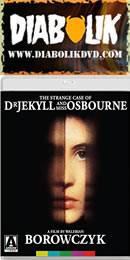
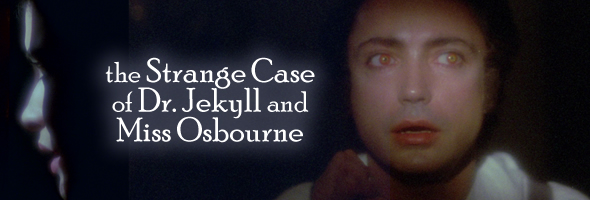
Color, 1981, 91m.
Directed by Walerian Borowczyk
Starring Udo Kier, Marina Pierro, Patrick Magee, Howard Vernon, Gérard Zalcberg, Clément Harari
Arrow (Blu-ray & DVD) (US R0 HD/NTSC, UK R0 HD/PAL) / WS (1.66:1) (16:9)


Color, 1981, 91m.
Directed by Walerian Borowczyk
Starring Udo Kier, Marina Pierro, Patrick Magee, Howard Vernon, Gérard Zalcberg, Clément Harari
Arrow (Blu-ray & DVD) (US R0 HD/NTSC, UK R0 HD/PAL) / WS (1.66:1) (16:9)
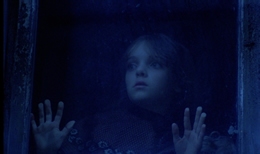 Few films in the Euro horror canon have attained the mystique of this beautiful, shocking, and
Few films in the Euro horror canon have attained the mystique of this beautiful, shocking, and 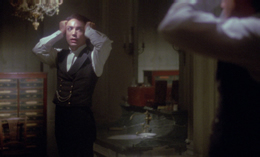 highly memorable fusion of antiquity, sensuality and violence from filmmaker Walerian Borowczyk. The title has often been brought up in reference books, magazines, and online forums, though comparatively few people had a chance to see it in anything resembling a complete or watchable edition anywhere in the world for decades. Thanks to both a slew of tantalizing stills and escalating renewal of interet in Borowczyk (sent into overdrive with Arrow's magnificent releases of his early major works), the film remained at the top of horror fanatics' wish lists for years beginning at the start of the DVD era with no relief in sight for what seemed like an eternity. Fortunately in 2015 Arrow stepped in with the release fans have been waiting for: a pristine, uncut, English-friendly release in the original aspect ratio, crammed with more extras than anyone could have hoped for.
highly memorable fusion of antiquity, sensuality and violence from filmmaker Walerian Borowczyk. The title has often been brought up in reference books, magazines, and online forums, though comparatively few people had a chance to see it in anything resembling a complete or watchable edition anywhere in the world for decades. Thanks to both a slew of tantalizing stills and escalating renewal of interet in Borowczyk (sent into overdrive with Arrow's magnificent releases of his early major works), the film remained at the top of horror fanatics' wish lists for years beginning at the start of the DVD era with no relief in sight for what seemed like an eternity. Fortunately in 2015 Arrow stepped in with the release fans have been waiting for: a pristine, uncut, English-friendly release in the original aspect ratio, crammed with more extras than anyone could have hoped for.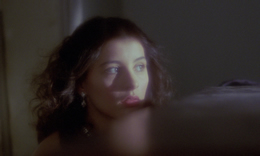 doors with his fiancee, Fanny Osbourne (Pierro, in the second of her Borowczyk films after Behind Convent Walls). Their impending nuptials are being celebrated with an overnight engagement party at a fancy estate home, but as we see in the opening sequence, a cane-wielding murderer is on the loose preying on young girls, or anyone else who might stray into his path. Among the guests are a strict English general (Dementia 13's Magee), who has an odd relationship with his carnal daughter, and a physician (Jess Franco regular Vernon). Both of them come into play when bodies start turning up around the house, starting with a young ballet dancer whose nocturnal performance is capped off with the discovery of her gruesomely violated body. Meanwhile Jekyll is behaving rather strangely, asking that his estate be left to someone named Mr. Hyde and occasionally sneaking off to his lab. However, the process of his transformation is a bit different compared to other versions: he now bathes in
doors with his fiancee, Fanny Osbourne (Pierro, in the second of her Borowczyk films after Behind Convent Walls). Their impending nuptials are being celebrated with an overnight engagement party at a fancy estate home, but as we see in the opening sequence, a cane-wielding murderer is on the loose preying on young girls, or anyone else who might stray into his path. Among the guests are a strict English general (Dementia 13's Magee), who has an odd relationship with his carnal daughter, and a physician (Jess Franco regular Vernon). Both of them come into play when bodies start turning up around the house, starting with a young ballet dancer whose nocturnal performance is capped off with the discovery of her gruesomely violated body. Meanwhile Jekyll is behaving rather strangely, asking that his estate be left to someone named Mr. Hyde and occasionally sneaking off to his lab. However, the process of his transformation is a bit different compared to other versions: he now bathes in 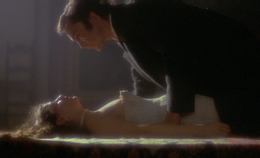 blood-red bathwater containing his elixir, and his transformation into Mr. Hyde (Zalcberg) also gives him an oversized, fatal endowment, an aspect censored from most prints of the film. It's really in the final fifteen minutes that the film really soars with a delirious climax completely different from any other edition of the tale, a feverisih and unforgettable concoction that ranks as one of Borowczyk's finest cinematic moments.
blood-red bathwater containing his elixir, and his transformation into Mr. Hyde (Zalcberg) also gives him an oversized, fatal endowment, an aspect censored from most prints of the film. It's really in the final fifteen minutes that the film really soars with a delirious climax completely different from any other edition of the tale, a feverisih and unforgettable concoction that ranks as one of Borowczyk's finest cinematic moments. 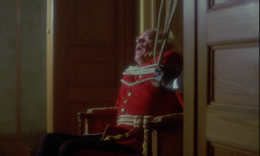 and Asia under a variety of titles. Initially it was called Dr. Jekyll and His Women and The Strange Case of Dr. Jekyll and Miss Osbourne in English, while French audiences (the few who saw it intact) encountered it as Dr. Jekyll et les femmes. The film never got an official release on American shores at all in theaters, instead turning up later in very heavily edited form on VHS under the title Bloodlust (in an unwatchably
and Asia under a variety of titles. Initially it was called Dr. Jekyll and His Women and The Strange Case of Dr. Jekyll and Miss Osbourne in English, while French audiences (the few who saw it intact) encountered it as Dr. Jekyll et les femmes. The film never got an official release on American shores at all in theaters, instead turning up later in very heavily edited form on VHS under the title Bloodlust (in an unwatchably 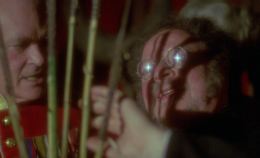 murky transfer to boot). Letterboxed but optically fogged copies of the Japanese VHS became a hot commodity on the trading circuit since they were the only full-length English option, while the French tape offered an opportunity to see it without any visual censorship. After that it dropped out of sight entirely around the world, refusing to pop up even on DVD anywhere at all until the Arrow edition.
murky transfer to boot). Letterboxed but optically fogged copies of the Japanese VHS became a hot commodity on the trading circuit since they were the only full-length English option, while the French tape offered an opportunity to see it without any visual censorship. After that it dropped out of sight entirely around the world, refusing to pop up even on DVD anywhere at all until the Arrow edition.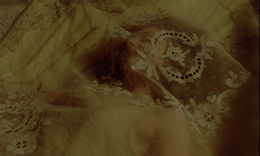 (with optional subtitles). There's a wealth of material here, not surprisingly, with Borowczyk getting some of the best moments as he talks about other films that inspired for this and other projects including Sir Henry at Rawlinson End, A Clockwork Orange, and even A Funny Thing Happened on the Way to the Forum, with tangents along the way including everything from Alien to the sympathetic natures of his characters.
(with optional subtitles). There's a wealth of material here, not surprisingly, with Borowczyk getting some of the best moments as he talks about other films that inspired for this and other projects including Sir Henry at Rawlinson End, A Clockwork Orange, and even A Funny Thing Happened on the Way to the Forum, with tangents along the way including everything from Alien to the sympathetic natures of his characters.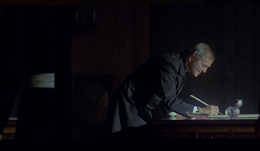
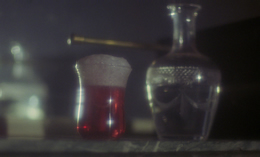 gets an astonishingly thoughtful and articulate 20 minutes to talk about her six-film working relationship with Borowczyk and her role as his muse for the last decade of his career. Excellent stuff. Sarah Mallinson wraps things up talking for 10 minutes about her work on the animation shorts of Borowczyk and Peter Foldes; do note that she speaks very softly so you'll need to crank up the volume a bit.
gets an astonishingly thoughtful and articulate 20 minutes to talk about her six-film working relationship with Borowczyk and her role as his muse for the last decade of his career. Excellent stuff. Sarah Mallinson wraps things up talking for 10 minutes about her work on the animation shorts of Borowczyk and Peter Foldes; do note that she speaks very softly so you'll need to crank up the volume a bit. ![]()